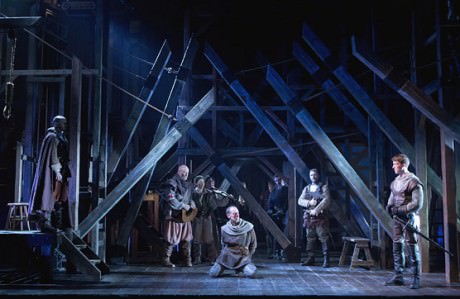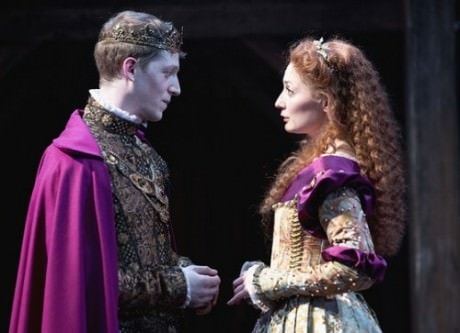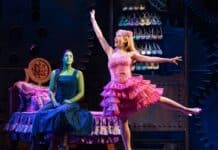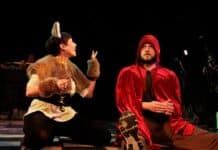![]()
Appelman and Cisek Plumb the Depths of Henry at the Folger Theatre
For a long time I’ve associated Shakespeare’s Henry V with men who go to war to come of age, or men who start a war to come of age, and since war is non-sense to me, Henry alway seems a little shallow. “We few, we happy few, we band of brothers!” – who would buy that crap? And who would sell it?
Not the Henry I saw at The Folger Theater Sunday night.

It’s hard to think about this play without seeing Kenneth Branagh’s face in the movie version he made years ago: it’s tilted up toward what’s right, and it’s knotted and blotchy with emotion — anguish, rage, and righteous indignation. Zach Appelman, who plays Henry in The Folger’s production, has a face as smooth as veal. It’s long and pale and probably cool to the touch. Most of the time it’s pointed down. I’m not sure this Henry thinks there’s any rightness to look up to.
That’s partially because of the set that Tony Cisek has designed for Henry’s story: dark timbers, iron pivots, crossing stairways, platforms, ropes as wide as wrists. It looks like a warehouse, or a wharf, neither of which would be good places for the play’s iconic moments, like the Battle of Agincourt, or the little touch of Harry visiting his men at night. Maybe the set is meant to suggest that, except for ceremony, a king’s no different from a stevedore. Or maybe since those rigid-looking massive timbers wind up moving, it’s supposed to suggest that the stablest foundations — Henry, England, honor – aren’t really stable at all.
And what about the nooses? Over there above an open trap door, which a guy in a heap on the floor seems to have fallen through before they got the rope around his neck. He’s the Chorus, it turns out. Did Robert Richmond, the director, push him through that hole? There’s another noose in the shadows on the left, and three more in back, half-hidden. This set’s a place for hanging people, not for making manhood out of war.
And this Henry is a man who hangs his friends. That’s why his face is pointed down.
So is every other Henry, of course: it’s in the script. At the beginning of Act II, Henry confronts three noblemen who have conspired with France against him. The scene seems meant to show that Henry is no longer Hal, the prince who drank and dawdled through his youth with fascinating men like Falstaff (who died in the scene before this one) and with lesser men like Bardolph, Nym, and Pistol, who resolve to join the force that’s bound for France so they can pilfer goods.
Henry hung with those men and with greater men as well – apparently greater – like Lord Scroop of Masham, who “bore the key to all of [Henry’s] counsels and knew the very bottom of [his] soul,” and who sold out Henry to the French, probably because he didn’t think prince Hal was hard enough to run a country. And he may be right. This Hal/Henry cries when Scroop confesses. He kneels beside his friend and puts his head against his friend’s head, and he cries. He feels Scroop’s betrayal “like another Fall of Man,” he says, and it appears to break the last of his illusions.

One way this Henry differs from the Henrys I’ve always imagined is that he doesn’t go to France expecting Man to get back up. His eyes are still red from crying when he takes Harfleur. He hollers at his men to throw themselves once more into the breach because they’re all lying on the ground. They’ve been knocked over by the force of French artillery, or by the force of disillusion – is there a difference? Does it matter? Henry has to drag them to the castle wall.
The fallen state of Man in this production is most obvious – and most chilling, and most beautiful – when Henry finds the body of Davy Gam, a boy who worked in the taverns where Henry used to drink with friends. Davy represents the possibility of redemption. He followed Pistol and Bardolph to France in hopes of cashing in along with them, but before long he realizes that they’re good for nothing whereas he can still have value, so he volunteers to serve as a steward, watching everybody’s gear behind the battle lines. He ought to be safe in that pursuit since the rules of war forbid attacking non-combatants, and that assignment ought to lead him to a better future than the cut-purse path he had been on.
Perhaps in fairy tales. Or maybe at a well-run private school.
I’ve always thought the words that Henry speaks when he finds Davy’s body should explode from his mouth. His army is outmanned ten to one. The French are urging him to ransom himself. His own people aren’t convinced that he has a legitimate claim on the land they’re attacking. He’s just suffered a tremendous wallop to the head, and when he circles back to gather up his wits he discovers that the French have slaughtered all the stewards.
But Robert Richmond, the director of this production, transfers that explosion from the actor to the set. All the inner chaos that would make an ordinary Henry burst in fits of rage is taken over by the timbers of the scaffold which fall in from both sides like broken pikes. To find the body of the boy who used to serve him drinks, this Henry has to clamber over slanted girders tangled up in ropes that run at inverse angles, all lit by the last of the explosions that knocked apart the structure of the way the world’s supposed to be.
“I was not angry since I came to France until this instant,” Appelman says, in monotone, without a flicker of emotion, because the emotions that would cause him to explode – as I expect – make sense only if you think betrayal is an aberration, only if you think that all the killing you yourself have done was somehow purified by rules. The moment when this Henry shows me that he doesn’t think that chills me to the core.
Tony Cisek’s set is an enormous sculpture that the actors play on. Andrew Griffin’s lighting fills the space with explosive flashes and then flickers like the sun on water. Michael Rasbury somehow makes Jessica Witchiger’s violin and voice come from everywhere at once. Excellent performances from James Keegan as Pistol, Cameron Pow as Fluellen, and Katie deBuys as charming Katherine enrich the play’s composite portrait of humanity.
But the show belongs to Appelman, whose performance changed the way I see the play completely. And to Robert Richmond, whose vision is the force behind it all. Folger Theatre’s Henry V is a great piece of theater, not to be missed.
Running Time: Two hours, with one fifteen-minute intermission.
Henry V plays at Folger Theatre – 201 East Capitol Street, in Washington, DC. For tickets, call the box office at (202) 544-7077, or purchase them online.





Beautiful review.